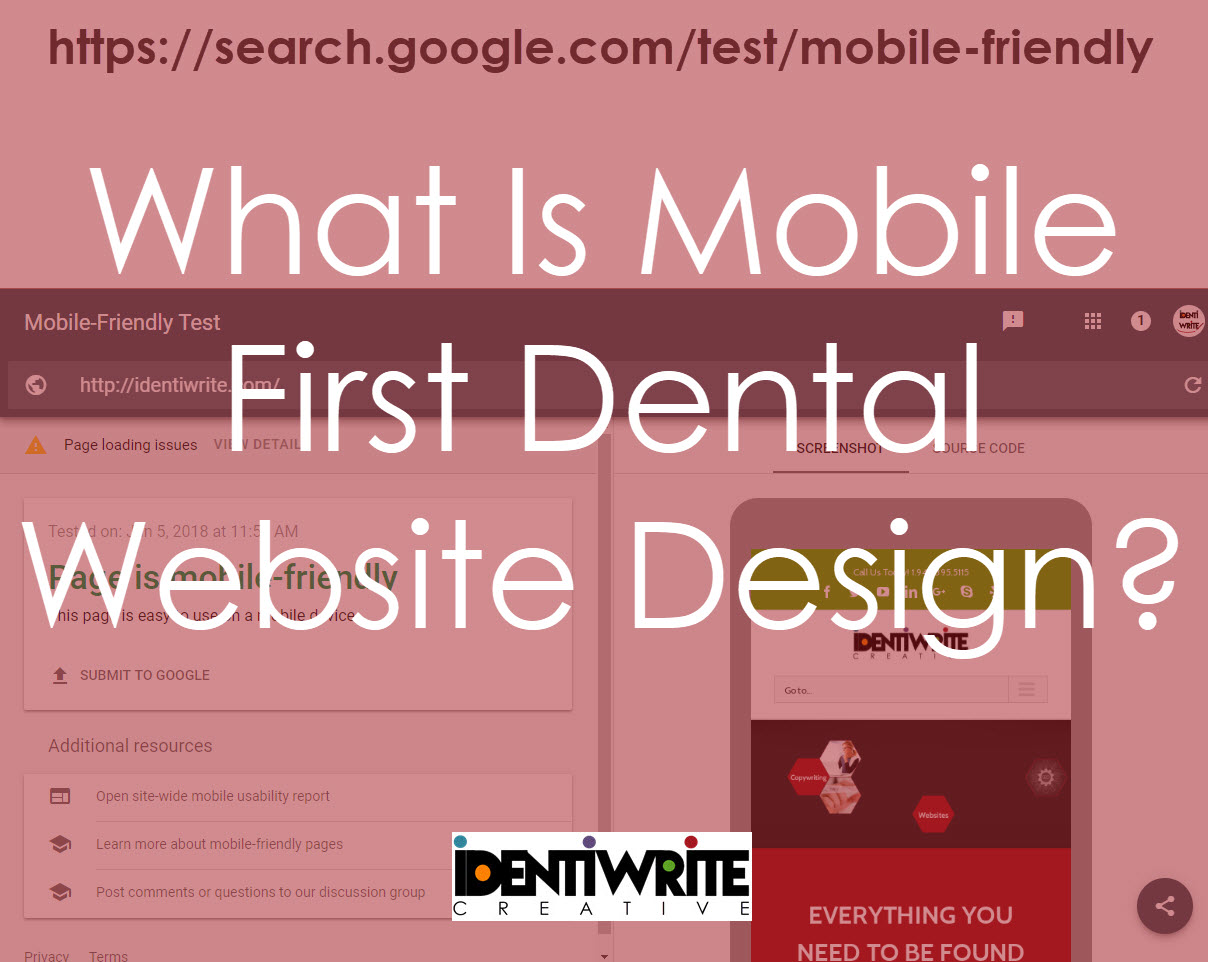Important: There is no separate Google index for mobile search.
When Google’s indexing robots crawl websites to determine how sites will rank in search results, the algorithm used will be mobile, not desktop, based.
This means, if a robot that’s indexing as an Android device or an iPhone device indexes your site, and the site is not generating properly on those devices, it will not rank well.
A website should fit completely within the screen of a mobile device, without having to scroll right and left. The menu, in most cases, collapses into an icon of three horizontal lines, which developers call a hamburger menu. The only scrolling necessary is up and down.
To please the mobile-first indexing agents, you need a responsive website design or a mobile site that shows up on mobile devices or a mobile URL that shows up on mobile devices.
The best option is a responsive design, in which you can turn on/off various features for mobile viewing.
Try Google’s mobile test to see how your site looks to Google’s mobile-first indexing agents.
Important: SEO factors remain consistent across mobile and desktop, so you must still have high-quality on-page and off-page search engine optimization.
Original content is absolutely essential to high-ranking websites. Before writing content for a site, we evaluate a dentist’s top competitors online to find out how much original text those websites have. Armed with facts, we can then create a strategic content marketing plan to truly compete! In some cases, a dentist needs original website text and a weekly blog to rank high, particularly in a competitive market.
Meta data is the wording that’s read first by search engines, and it explains a page’s topic. We see meta titles and descriptions in search engine results pages (SERPs). Every page on a website needs unique, strategic meta data.
Alt-image tags are the words behind pictures that tell search engines and auto-readers what an image represents. These tags help with SEO and voice software that reads content for the visually impaired.
H-tags are coded tags that tell indexing robots which parts of text are intended as headings. H-1s are primary headings, H2s are secondary, H3s are tertiary, and so forth. Headings acquire more SEO credit than body content, so H-tags are valuable.

Keyword integration is still extremely important, though meta-keywords are not. So, you may have heard that keywords are not important, but that’s not true. We look at the most popular terms in search, by region, in the categories of services and symptoms in dentistry, using Google Adword’s keyword tool. Keywords are then implemented into text, headings, links, metadata, and image tags. Too many keywords is bad; we call it keyword stuffing. Too few is ineffective.
Internal linking has to do with embedding links to pages on the same website, within related keyword phrases in content. There are rules for internal linking to ensure optimal effectiveness.
Quality backlinks, or incoming links, are links coming in to a website from related sites that have good traffic and a good reputation. For instance, a link to a dentist’s website from the ADA’s website is a quality backlink. Paid links from link farms are bad and can get a site blacklisted (taken out of Google Search for six months or longer, as punishment). Acquiring or earning backlinks can be extremely difficult. If your site has bad backlinks, they should be submitted for disavowal to Google through Google Search Console (formerly Google Webmaster Tools), a free service that you can subscribe to, along with Google Analytics.
Online reviews from patients are now an important factor for SEO, as part of a dentist’s online reputation. The most important sites for online reviews are Google Search or Google +, Yelp!, Facebook, and HealthGrades. There are ways to encourage patients to leave reviews for you, without appearing needy or pompous, and we can also integrate live reviews into your website.
What Dentists Don’t Need
Knowing what you don’t need is as important as knowing what you do need, so that you don’t waste time and money. Dentists are simple business to consumer (B2C) entities that provide limited services. There is no wholesale pricing, no mail order, no return policy, no international shipping or exchange rate. Dental offices have limited requirements and needs, when it comes to online marketing. Therefore, you will likely hear about products and services that you do not need. For instance, most dental practices do not need websites on private servers. Investing in a private server is a waste of money. Dentists do not need to employ rich snippets, which are important for retailers and restaurants, or hreflang tags, which provide alternate web content for visitors in various countries.

Hire an Expert to Maximize Your Dental Marketing
If your website is not mobile-ready and well optimized, you’re in trouble! I’m Shauna Duty, and I’ve worked with dentists for over 15 years, providing search engine optimized websites, text, and marketing consulting to private and group practices. My agency, Identiwrite Creative, can help your dental office maneuver the changing terrain of online marketing. Call me today at 940-395-5115, or email [email protected], to discuss your website or online marketing needs.



